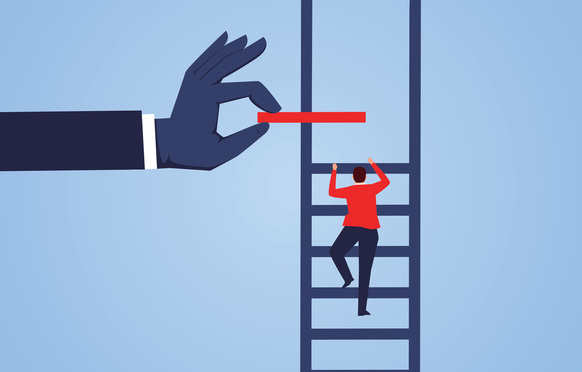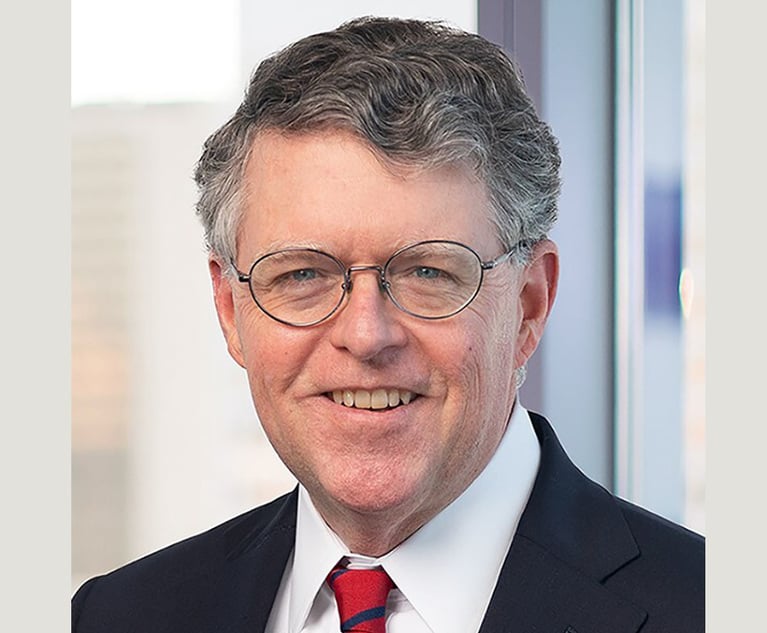No Free Lunch: How to Chart Your Course to Success as a Government Lawyer
You're now trading your pocket square or designer bag for a lapel pin and government-issued laptop case. How do you successfully transition into a new role and a new structural model?
February 25, 2020 at 11:54 AM
5 minute read

You have paid down your substantial educational debt, convinced your family that despite the hundreds of thousands of dollars in lost income that this will pay huge experiential dividends, and you have begun to allow yourself to imagine a public service-centric legal position divorced from the billable hour.
 Having distinguished yourself during the interview process, rediscovered addresses you had long since forgotten as part of your Standard Form 86 (SF-86) background process, you're now trading your pocket square or designer bag for a lapel pin and government-issued laptop case. How do you successfully transition into a new role and a new structural model, not to mention a vast bureaucracy that dictates everything from when you can travel to how many boxes of toner you are allotted?
Having distinguished yourself during the interview process, rediscovered addresses you had long since forgotten as part of your Standard Form 86 (SF-86) background process, you're now trading your pocket square or designer bag for a lapel pin and government-issued laptop case. How do you successfully transition into a new role and a new structural model, not to mention a vast bureaucracy that dictates everything from when you can travel to how many boxes of toner you are allotted?
Following the transition to the public sector, first, embrace the concept that nothing is beneath you. Some of the best advice I ever received from a former assistant U.S. attorney turned Big Law partner: treat every investigation, matter or task with the same dedication that you would the highest-profile case in the office.
That means you should treat the search warrant affidavit with the same level of care and detail that you would a major government fraud indictment. Both are documents that infringe on someone's liberty, are filed with the court, and reflect on you, your office and the Department of Justice.
Do the little things each time. For those new to the government, you are establishing your reputation in a new setting. Almost all lawyers care about their reputations, but as an AUSA or DOJ trial attorney, you are no longer protected by "zealous advocacy for your client" as a heat shield for your conduct. As most judges will be quick to point out, they expect more from the government. This commitment to excellence and dedication on all matters will establish your reputation as someone who can be relied on by the bench as well as senior management. It will also create good habits right from the outset.
One of the great aspects of public-sector lawyering is that it is still largely a meritocracy where the management of investigations and the courtroom becomes a great equalizer. If you make the most of your opportunities, are prepared and execute under pressure, it is generally rewarded with additional responsibility and patronage from client agencies, law enforcement partners and supervisors. As the old saying goes, I have never had a juror ask where I went to law school. After years of being corralled and sorted by LSAT score, it can be quite liberating to have opportunities to be evaluated on your legal abilities in the arena.
The majority of AUSAs and DOJ trial attorneys work very hard. In the age of terabyte after terabyte of electronic discovery, increased collateral and posttrial litigation, as well as incessant retroactive application of new jurisprudence and statutes to adjudicated cases, it is not uncommon to put in 12- to 15-hour days and weekends. The difference, however, is the level of autonomy. The work has to get done, but it is largely on you to complete these tasks. You will often have the luxury of going to see your witnesses, agents and partners out in the field and build those critical relationships that you will need to have success in navigating the investigation and case ahead.
Early on as an AUSA, I was working a very complicated arson and insurance fraud case. I ended up spending about a week in the field interviewing firefighters at their stations in between calls and spending hours with the certified fire examiner walking me through the gutted property. It was a luxury to be able to do so, and one that paid huge dividends in terms of the relationship and trust I developed with the witnesses and an understanding of the physical structure that rivaled that of the defendant arsonist. Further, this time out from behind your desk with your trial partner and investigative agents is crucial team-building. As you and your team plow through the turbulent waters of trial prep and the trial itself, you will never regret the time you spent together during the investigative phase.
Given that there are always collateral duties that need a point-of-contact in public service, be a proactive volunteer in your office or section. Volunteer to do the pretrial briefing to alleviate additional work on your trial team. Who knows, it might lead to the chance to argue the motion or even sit third chair. Develop an expertise on an esoteric area of the law that keeps rearing its head. Offer to draft a speech for the principal, or show initiative and gain management experience by offering to run the law clerk or intern program. The main point is: challenge yourself by getting out of your comfort zone.
Due to life circumstances, finances or an election, your time in public service might end earlier than you would like. You owe it to yourself, your employer and the taxpayers to make the most of it.
G. Zachary Terwilliger is the 62nd U.S. attorney for the Eastern District of Virginia. As the chief federal law enforcement officer in the Eastern District of Virginia, he oversees approximately 300 public servants. Terwilliger previously served as associate deputy attorney general and chief of staff in the Office of the Deputy Attorney General at the Department of Justice in Washington, D.C.
This content has been archived. It is available through our partners, LexisNexis® and Bloomberg Law.
To view this content, please continue to their sites.
Not a Lexis Subscriber?
Subscribe Now
Not a Bloomberg Law Subscriber?
Subscribe Now
NOT FOR REPRINT
© 2025 ALM Global, LLC, All Rights Reserved. Request academic re-use from www.copyright.com. All other uses, submit a request to [email protected]. For more information visit Asset & Logo Licensing.
You Might Like
View All
Switching Positions: US Solicitors General and Climate Change Lawsuits
6 minute read
Jimmy Carter’s 1974 Law Day Speech: A Call for Lawyers to Do the Public Good
14 minute readTrending Stories
- 1'It's Not Going to Be Pretty': PayPal, Capital One Face Novel Class Actions Over 'Poaching' Commissions Owed Influencers
- 211th Circuit Rejects Trump's Emergency Request as DOJ Prepares to Release Special Counsel's Final Report
- 3Supreme Court Takes Up Challenge to ACA Task Force
- 4'Tragedy of Unspeakable Proportions:' Could Edison, DWP, Face Lawsuits Over LA Wildfires?
- 5Meta Pulls Plug on DEI Programs
Who Got The Work
Michael G. Bongiorno, Andrew Scott Dulberg and Elizabeth E. Driscoll from Wilmer Cutler Pickering Hale and Dorr have stepped in to represent Symbotic Inc., an A.I.-enabled technology platform that focuses on increasing supply chain efficiency, and other defendants in a pending shareholder derivative lawsuit. The case, filed Oct. 2 in Massachusetts District Court by the Brown Law Firm on behalf of Stephen Austen, accuses certain officers and directors of misleading investors in regard to Symbotic's potential for margin growth by failing to disclose that the company was not equipped to timely deploy its systems or manage expenses through project delays. The case, assigned to U.S. District Judge Nathaniel M. Gorton, is 1:24-cv-12522, Austen v. Cohen et al.
Who Got The Work
Edmund Polubinski and Marie Killmond of Davis Polk & Wardwell have entered appearances for data platform software development company MongoDB and other defendants in a pending shareholder derivative lawsuit. The action, filed Oct. 7 in New York Southern District Court by the Brown Law Firm, accuses the company's directors and/or officers of falsely expressing confidence in the company’s restructuring of its sales incentive plan and downplaying the severity of decreases in its upfront commitments. The case is 1:24-cv-07594, Roy v. Ittycheria et al.
Who Got The Work
Amy O. Bruchs and Kurt F. Ellison of Michael Best & Friedrich have entered appearances for Epic Systems Corp. in a pending employment discrimination lawsuit. The suit was filed Sept. 7 in Wisconsin Western District Court by Levine Eisberner LLC and Siri & Glimstad on behalf of a project manager who claims that he was wrongfully terminated after applying for a religious exemption to the defendant's COVID-19 vaccine mandate. The case, assigned to U.S. Magistrate Judge Anita Marie Boor, is 3:24-cv-00630, Secker, Nathan v. Epic Systems Corporation.
Who Got The Work
David X. Sullivan, Thomas J. Finn and Gregory A. Hall from McCarter & English have entered appearances for Sunrun Installation Services in a pending civil rights lawsuit. The complaint was filed Sept. 4 in Connecticut District Court by attorney Robert M. Berke on behalf of former employee George Edward Steins, who was arrested and charged with employing an unregistered home improvement salesperson. The complaint alleges that had Sunrun informed the Connecticut Department of Consumer Protection that the plaintiff's employment had ended in 2017 and that he no longer held Sunrun's home improvement contractor license, he would not have been hit with charges, which were dismissed in May 2024. The case, assigned to U.S. District Judge Jeffrey A. Meyer, is 3:24-cv-01423, Steins v. Sunrun, Inc. et al.
Who Got The Work
Greenberg Traurig shareholder Joshua L. Raskin has entered an appearance for boohoo.com UK Ltd. in a pending patent infringement lawsuit. The suit, filed Sept. 3 in Texas Eastern District Court by Rozier Hardt McDonough on behalf of Alto Dynamics, asserts five patents related to an online shopping platform. The case, assigned to U.S. District Judge Rodney Gilstrap, is 2:24-cv-00719, Alto Dynamics, LLC v. boohoo.com UK Limited.
Featured Firms
Law Offices of Gary Martin Hays & Associates, P.C.
(470) 294-1674
Law Offices of Mark E. Salomone
(857) 444-6468
Smith & Hassler
(713) 739-1250












